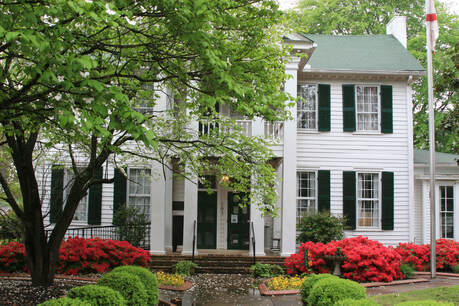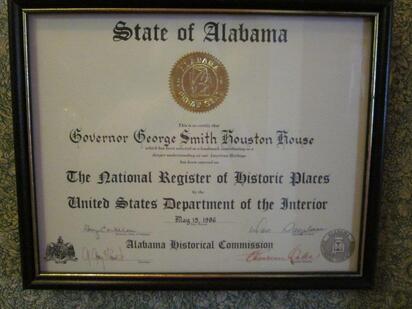About the Houston House
The Houston Home is located at 101 North Houston Street and is only two blocks from downtown Athens. It has served Athens and Limestone county as a traditional old-time lending library and museum since 1938. The house has stood sentinel over the growth and development of downtown Athens for 183 years. The Houston House not only is historically significant and invaluable as a landmark to the City of Athens but also has, on occasion, brought the city of Athens into the national spotlight.
Partners Robert Beaty and John Carrol bought the site that became the City of Athens at a government land auction and began selling lots in 1818 when the plot of land where the Houston House now stands was originally bought. The city of Athens was incorporated on November 19, 1818, more than one year before Alabama was admitted into the Union on December 14, 1819. Interestingly, the plot of land where the Houston House now stands was sold before the City of Athens and the State of Alabama were even incorporated.
In 1829, the property was purchased by John McKinley, a land speculator who lived in Huntsville and was on of the principal founders of the city of Florence. Even though John McKinley never built a home on his Athens property, he donated the land that eventually housed Athens State University. McKinley was a Senator and later became an Associate Justice of the Supreme Court of the United States, the first of only three justices to serve from the State of Alabama.
The plot of land exchanged hands several times and in 1834 was sold to Micajah Thomas. Thomas built the original house which might have been built around an earlier log structure. It is believed that the architect of the house was Hiram Higgins, who designed and built the 1835 Limestone County courthouse, as well as Founders Hall of the the Athens State University campus.
It is important to note that Micajah Thomas was married to Louisa Keyes who was the daughter of Revolutionary War veteran, John Wade Keyes. Captain Keyes was certainly placed on a national level as he was engaged in the battles of Bunker Hill, Lexington, Trenton, and other famous battles. Also, Captain Keyes was married to the niece of President James Monroe. The Keyes settled and built a home in Athens. More than likely, the venerable Captain Keyes and his wife Louisa visited their daughter and son-in-law in their home in Athens in what we now call the Houston House. By 1900, the patriotic women of Athens formed a chapter of the Daughters of the American Revolution which was named for the Revolutionary War patriot, John Wade Keyes.
On October 31, 1845, George Smith Houston and his wife, Mary Beaty Houston, the daughter of one of Athens’ founders, Robert Beaty, bought the house and property on West Street which was later named Houston Street in the Governor's honor. The Houstons remodeled their new home before moving in, and it is believed that during this time the pilasters on either side of the front door entrance were added as well as four square, wooden columns that support a two story portico and a second floor balcony. Also, a two-story addition was added on the back of the house. Sometime during the late 19th century, a dining room was added on the north side of the house. There is evidence that at various time as many as seven different outbuildings existed on the property including kitchen, servants' quarters, carriage house, and well house. More than likely the foundations of these outbuildings still exist on the property today.
George and Mary Beaty Houston had a large family of eight children, four of whom died before 1860. Houston’s wife Mary died in 1856, and in 1861, he married Ellen Irvine of Florence, with whom he had two additional children. Surely the house was filled with the laughter, activity, and excitement of having ten children coming and going through the years.
Houston had a love of entertainment and had many soirees and dances in the stately home. It is said that he would stand in the southwest corner of the parlor by the fireplace and watch his guests dance and enjoy the music provided by the piano which is still in the house today. It is reported that when Houston fell ill, a bed was set up for warmth in front of the very fireplace where he stood and welcomed guests. This is where he died on December 31, 1879. Upon his death, it was ordered that the public offices be closed on the day of his burial and that the capital be draped in mourning for thirty days.
The home is significant as a good local example of Federal period residential architecture with Greek revival features and some later Victorian details. It is one of less than a dozen Federal period residences in Athens and provides an excellent representation of original Federal Period woodwork.
The heirs of George S. Houston donated the home to the City of Athens with the stipulation that it be used as a library and museum and a meeting place for literary and patriotic societies. It was also stipulated that if it was not used as intended, it would revert to the Houston heirs. In 1988, the City of Athens was able to acquire the home by quitclaim deed, and all stipulations were removed.
The Houston House was added to the National Register of Historic Places on May 15, 1986.

